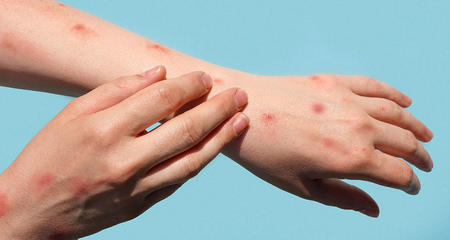Typical measles symptoms include a rash that starts in the face before extending to the belly and then the extremities, as well as a cough, runny nose, fever and red eyes.
Measles was eradicated from the U.S. several years ago, but during the past few years, people who visited other countries brought measles back to the U.S. Measles is spreading in the U.S. because many people in our country stopped receiving the vaccination for various reasons or beliefs.
Measles Transmission, Prevention and Immunity
Measles is one of the most contagious infectious diseases. It is spread through respiratory secretions, such as a cough or a sneeze.
The best way to protect yourself and loved ones is to get vaccinated or have evidence of previous exposure (immunity) to measles. You are immune to measles if you have documentation of any of the of the following:
- You’ve received two doses of measles-containing vaccine.
- You’ve had a blood test that determines immunity.
- You’ve had a blood test that confirms you were exposed to measles.
- You were born before or around 1957.
Here are some tips to find your vaccination records.
Measles Vaccinations
If you were born after 1957, and you do not have evidence of immunity against measles, you should get at least one does of the measles, mumps and rubella (MMR) vaccine.
If you don't have vaccination records, contact your primary care physician to ask for one dose of the MMR vaccine.
Because the MMR vaccine is a live vaccine, the following groups of patients should not get vaccinated.
- Those with severe life threatening allergies
- Women who are pregnant (women should avoid getting pregnant for at least one month after getting the MMR vaccine)
- Those with immunosuppression, such as receiving chemotherapy, steroids, or those with advanced AIDS (note that HIV positive status alone is not a contraindication)
- Those with tuberculosis
- Those who’ve had a live vaccine in the past 4 weeks
- Those with certain precautions for vaccination: moderate or severe acute illness, recent receipt of antibody containing blood products, thrombocytopenia, personal or family history of seizures


